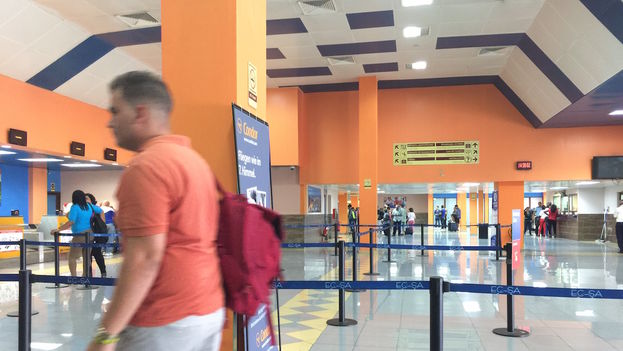
![]() 14ymedio, 24 June 2016 – Cuba’s General Customs of the Republic has announced that it will strengthen the infrastructure of detection in air and sea terminals throughout this year to counter “phenomena such as drug trafficking, violations of the security of the country and smuggling of endemic species,” according to a report in the official press on Friday.
14ymedio, 24 June 2016 – Cuba’s General Customs of the Republic has announced that it will strengthen the infrastructure of detection in air and sea terminals throughout this year to counter “phenomena such as drug trafficking, violations of the security of the country and smuggling of endemic species,” according to a report in the official press on Friday.
Moraima Rodríguez Nuviola, assistant director of Customs Control Systems, in a meeting with the press on Thursday, highlighted the need to strengthen “risk management, the preparation of forces, and the acquisition and mastery of modern technologies.”
With the increasing number of tourists in recent months, following the immigration reforms that eased travel for Cubans beginning in 2013, the work of the customs service has experienced an increased “level of complexity,” especially in detecting communications technologies coming into the country, because of the advancements in these technologies in recent years, said Rodriguez Nuviola.
Customs keeps a tight control over satellite transmission and reception equipment, literature critical of the Government, controversial audiovisual materials and technology to create wireless networks. During the strict customs searches, which include scanning each bag, they also look for external hard drives and other data storage devices.
Methods of circumventing the restrictions have diversified, acknowledged the official, and there has been an increase in “diverse methods of hiding the introduction of these methods into the country (bringing them in parts and pieces hidden inside the frames of similar equipment).”
Between January and May, the entity foiled a total of 41 cases of transportation of drugs, among them six kilograms of cocaine and seven of marijuana. During this period, they also detected 817 violations defined as the “introduction of devices, satellite equipment and subversive literature aimed at the counterrevolution.”
There has also been an increase “in attempts to bring in weapons, parts and ammunition and an increased detection of subversive printed materials in different formats,” said Rodriguez Nuviola.
In the absence of a legal framework for commercial imports destined for private hands, many travelers use their personal baggage to bring into the country goods such as clothing, footwear and medicines, which are subsequently sold on the informal market.
With regards to bringing in undeclared cash, in the first five months of the year Customs detected at least 47 cases in which they have recovered the smuggling of 1,598 Cuban convertible pesos, 63,924 dollars and 1,100 euros.
In the face of new conditions, Nelson Cordobes Reyes, first deputy head of the Cuban Customs, reinforced that the “control activity in the field of Aviation Security at the exit from international airports, particularly for direct flights to the United States” will be strengthened. Customs will also invest in new “technical means of detection and control.”
Cuban activists and opponents have regularly denounced the confiscation by the authorities of literature, computers, external hard drives and business cards. As a rule, despite following the process for reclaiming possessions, travelers are unable to retrieve the items confiscated from them.
